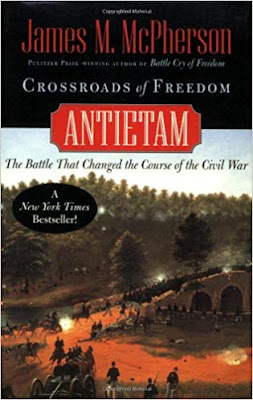Book in Review: Antietam
James McPherson is as close to authoritative as Civil War
historians get. Having a few years ago read his excellent Battle Cry of Freedom, I enjoyed picking up this much slenderer
volume on the turning point of the war: Antietam.
Like the best historians, McPherson loads his narrative with
swaths of direct quotations from an array of sources: newspapers, soldier's
journals, officers, foreign dignitaries...etc. With this information he spends
over half of the book setting the stage for Antietam. We learn about the
extreme sway of morale as the conflict evolved, the Union success on the
Western Front, and the Confederate success of Second Manassas. These events
provide needed context for the clash to come.
There is little question that the Battle of Antietam is the
turning point of the Civil War. So much hinged on the outcome of one day. A
Confederate victory would have likely pushed voters in the North to support the
Democrats--a party looking for peace. On top of that, a crucial victory for the
South would have induced opportunistic foreign powers to recognize Southern
Independence and perhaps even look to get involved further. In a game of
momentum such a victory would have been a massive morale boost for the south,
rendering any Lincolnian Emancipation Proclamation an act of defensive
desperation.
 But somethings are not to be, and sometimes the greatest
events are determined by the seemingly inexplicable. In one of the most bizarre
events imaginable, Union troops stumbled upon Robert E. Lee's marching orders,
wrapped around a few cigars. This providential discovery was enough information
to cause even the impotent McClellan to advance in haste towards Lee's divided
and exposed forces. What followed on September 17, 1862 is what remains to this
day as the bloodiest day in American Military history; a battle that was both a
victory and a missed opportunity for the North.
But somethings are not to be, and sometimes the greatest
events are determined by the seemingly inexplicable. In one of the most bizarre
events imaginable, Union troops stumbled upon Robert E. Lee's marching orders,
wrapped around a few cigars. This providential discovery was enough information
to cause even the impotent McClellan to advance in haste towards Lee's divided
and exposed forces. What followed on September 17, 1862 is what remains to this
day as the bloodiest day in American Military history; a battle that was both a
victory and a missed opportunity for the North.
Though the North pushed the Southern advance back into
Virginia, McClellan failed to utilize his numerical advantage. McPherson
writes: "Never during that long, bloody day from dawn to dusk did
McClellan get more than 20,000 men into action at the same time; 20,000 of his
soldiers did not fire a shot at all." If the Northern army was more
competently commanded, this reader imagines the Civil War could have been a
much shorter affair.
So while the North won, Antietam was a savage conflict that
could have been a greater Northern success. Still, it did dissuade foreign
powers from Southern Recognition. It also gave Lincoln the grounds to announce
the Emancipation Proclamation and alter the fabric of the American future
forever.
This is a great book, something that even the most
uninformed reader can enjoy. The writing is excellent, and there are several
clear maps with sequential numbers and dates providing much added detail to the
descriptions.



Comments
Post a Comment